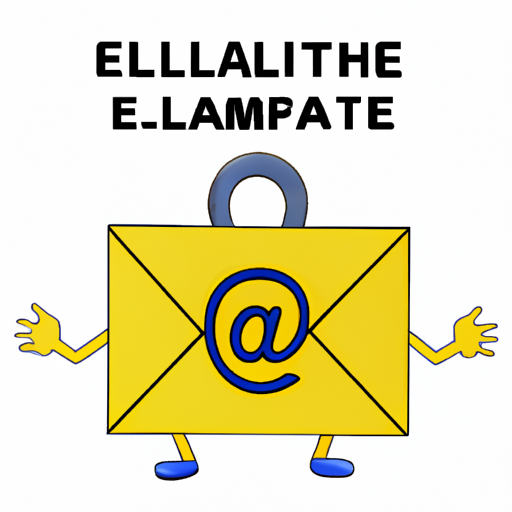In today’s digital age, email has become a crucial communication tool for both personal and professional purposes. However, the effectiveness of an email often hinges on that all-important subject line. Ensuring compliance with email subject line regulations is not only important for adhering to legal requirements, but it can also significantly impact the success of your email marketing campaigns. In this article, we will delve into the importance of email subject line compliance and provide you with practical tips on how to craft compelling subject lines that engage your audience and boost your open rates. With a comprehensive understanding of email subject line compliance, you will be equipped to create impactful email marketing strategies that effectively communicate your message to recipients.

1. Overview of Email Subject Line Compliance
Email subject line compliance refers to the adherence to regulations and guidelines set forth by various laws and email service providers (ESPs) when crafting and sending email subject lines. Complying with these regulations is of utmost importance for businesses engaging in email marketing campaigns. This article will provide an in-depth understanding of the importance of email subject line compliance, the consequences of non-compliance, key regulations to consider, and the benefits of compliant subject lines.
1.1 Importance of Email Subject Line Compliance
Email subject line compliance is crucial for businesses as it ensures ethical and legal email marketing practices. By complying with regulations, businesses uphold their reputation, maintain customer trust, and minimize the risk of legal consequences. Compliant subject lines also contribute to higher open rates, click-through rates, and ultimately, successful email marketing campaigns.
1.2 Consequences of Non-Compliance
The consequences of non-compliant email subject lines are significant and can have severe repercussions for businesses. Violations can result in hefty fines, legal action, damage to brand reputation, and even being marked as spam by ESPs. It is essential for businesses to understand and abide by the regulations to avoid these potential pitfalls.
1.3 Key Email Subject Line Regulations
Several laws and guidelines regulate email subject lines. The Can-Spam Act in the United States sets requirements for commercial email communications, emphasizing the need for accurate and honest subject lines. The General Data Protection Regulation (GDPR) in the European Union also provides guidelines on consent and transparency in relation to email subject lines. Additionally, other email marketing laws, such as Canada’s Anti-Spam Legislation (CASL), should be considered to ensure compliance.
1.4 Benefits of Compliant Email Subject Lines
Compliant email subject lines offer numerous benefits to businesses. They establish trust with recipients, leading to improved brand reputation and increased customer engagement. Compliant subject lines also help businesses avoid legal ramifications, maintain deliverability rates, and achieve better marketing campaign results. Investing time and effort into crafting effective and compliant subject lines is crucial for long-term business success.
2. Understanding Email Subject Line Regulations
To ensure email subject line compliance, it is essential to understand the various regulations and guidelines put forth by different entities. In this section, we will delve into the requirements of the Can-Spam Act, GDPR guidelines, other relevant email marketing laws, and best practices for compliance.
2.1 Can-Spam Act Requirements
The Can-Spam Act establishes several requirements for commercial email communications in the United States. It mandates that subject lines must accurately reflect the content of the email and should not be deceptive or misleading. The act also emphasizes the need for proper identification of the sender and provision of a clear and functional unsubscribe mechanism.
2.2 GDPR Guidelines for Email Subject Lines
The GDPR, applicable to businesses operating in the European Union, focuses on protecting individual privacy rights. When it comes to email subject lines, GDPR requires organizations to obtain explicit consent from recipients and inform them about the purpose and nature of the communication. Transparency and clarity are key elements of GDPR-compliant subject lines.
2.3 Other Applicable Email Marketing Laws
In addition to the Can-Spam Act and the GDPR, businesses must consider other laws that regulate email marketing practices. For example, CASL in Canada requires organizations to obtain consent before sending commercial electronic messages, including emails. Familiarizing oneself with these laws ensures comprehensive compliance and maintains a positive business image.
2.4 Best Practices for Compliance
Compliance with email subject line regulations extends beyond legal requirements. Following best practices enhances the effectiveness of email marketing campaigns and fosters trust with recipients. These practices include regular compliance audits, proper email authentication, respecting recipient preferences, and staying informed about regulatory changes. By adopting these practices, businesses demonstrate a commitment to ethical and responsible email marketing.
3. Crafting Effective and Compliant Email Subject Lines
Crafting email subject lines that are both effective and compliant can be a challenging task. This section will explore various aspects that contribute to the creation of successful subject lines, including clarity and relevance, avoiding deceptive language, maintaining an optimal length, personalization and segmentation, urgency and call-to-action, testing and analysis, and examples of effective subject lines.
3.1 Clarity and Relevance
Clear and relevant subject lines are essential to engage recipients and encourage them to open emails. Businesses should ensure that subject lines accurately represent the content of the email, avoiding vague or misleading wording. By providing a concise summary of the email’s purpose, businesses increase the likelihood of recipients engaging with the message.
3.2 Avoiding Deceptive Language
Deceptive language in subject lines is a violation of regulations and can cause recipients to disregard or mark emails as spam. Businesses should avoid making false promises or using sensationalized language. Honesty and transparency are crucial in building a strong email marketing strategy and maintaining compliance.
3.3 Length and Conciseness
The length of an email subject line plays a vital role in its effectiveness. Subject lines that are too long may get cut off or lose impact, while ones that are too short may lack the necessary context. Striking a balance between conciseness and providing enough information is critical for capturing recipients’ attention and encouraging them to open the email.
3.4 Personalization and Segmentation
Personalized subject lines have been proven to yield higher engagement rates. By addressing recipients by their name or incorporating other personal details, businesses can create a sense of relevance and connection. Additionally, segmenting email lists based on factors such as demographics or buying behaviors allows businesses to tailor subject lines to specific groups, further enhancing their impact.
3.5 Using Urgency and Call-to-Action
Creating a sense of urgency and incorporating clear call-to-action phrases in subject lines can significantly increase open and click-through rates. By using words such as “limited time offer” or “act now,” businesses prompt recipients to take immediate action, thus increasing the chances of conversions.
3.6 Testing and Analyzing Subject Lines
Testing different subject lines and analyzing their performance is essential for optimizing email marketing campaigns. A/B testing allows businesses to understand what resonates with recipients and refine their subject lines accordingly. By continuously monitoring and adapting to the results, businesses can enhance their compliance and overall email marketing strategy.
3.7 Examples of Effective Subject Lines
Effective subject lines vary depending on the industry and target audience. Here are a few examples of compliant subject lines:
- “Exclusive Offer: 20% Off Your Next Purchase!”
- “Important Notice: Upcoming Changes to Our Services”
- “Breaking News: Industry Insights and Trends”
- “John, Don’t Miss Out on Our New Product Launch!”
These examples demonstrate the use of clarity, relevance, personalization, and urgency to engage recipients while remaining compliant with regulations.
4. Ensuring Compliance with Email Service Providers
Successful email marketing campaigns require compliance not only with legal regulations but also with ESP policies. This section will explore the importance of reviewing and complying with ESP’s policies, ensuring proper authentication and sender reputation, compliance monitoring and auditing, and implementing efficient unsubscribe and opt-out mechanisms.
4.1 Reviewing and Complying with ESP’s Policies
Each ESP has its own set of policies and guidelines governing email marketing practices on their platforms. Businesses must thoroughly review and understand these policies to ensure their email subject lines comply. Violations of ESP policies can lead to account suspensions or terminations, hindering business operations.
4.2 Authentication and Sender Reputation
Maintaining a positive sender reputation is essential for email deliverability and compliance. Businesses should authenticate their emails using SPF, DKIM, and DMARC protocols to verify sender identity and reduce the risk of being marked as spam. By adhering to authentication practices, businesses enhance their email subject line compliance and improve overall email marketing performance.
4.3 Compliance Monitoring and Auditing
Regularly monitoring and auditing email campaigns for compliance is crucial for identifying and rectifying any violations. Implementing robust compliance monitoring procedures allows businesses to address non-compliant subject lines promptly, reducing the risk of legal consequences and negative brand perception.
4.4 Unsubscribe and Opt-Out Mechanisms
Providing clear and accessible unsubscribe and opt-out mechanisms is not only a legal requirement but also a best practice. By making it easy for recipients to opt-out of receiving further emails, businesses demonstrate respect for their preferences and maintain compliance. Regularly monitoring and processing unsubscribe requests is vital for ongoing compliance and customer satisfaction.
5. Common Mistakes to Avoid in Email Subject Lines
To ensure compliance and maximize the effectiveness of email subject lines, businesses must be aware of common mistakes to avoid. This section will discuss using misleading claims or false promises, overusing capital letters or punctuation, neglecting localization and cultural sensitivities, failing to maintain consistency, and neglecting A/B testing and optimization.
5.1 Using Misleading Claims or False Promises
Subject lines that make untrue or exaggerated claims are not only non-compliant but also erode customer trust. Businesses should avoid using phrases such as “guaranteed,” “exclusive,” or “once-in-a-lifetime opportunity” unless they can substantiate the statements within the email. Honesty and authenticity are essential in maintaining a positive brand reputation.
5.2 Overusing Capital Letters or Punctuation
Subject lines written in all capital letters or with excessive punctuation marks appear unprofessional and can be perceived as spam. Businesses should use capitalization and punctuation sparingly for emphasis and readability. An overly aggressive or cluttered subject line may prompt recipients to disregard the email, reducing open rates.
5.3 Ignoring Localization and Cultural Sensitivities
Email marketing campaigns often target diverse audiences across different regions and cultures. Ignoring localization and cultural sensitivities can lead to offensive or inappropriate subject lines, damaging brand reputation. Businesses should conduct research and consider local customs, traditions, and preferences when crafting subject lines to ensure compliance and avoid any unintended negative impact.
5.4 Failing to Maintain Consistency
Consistency in email subject lines helps recipients recognize and trust the sender. Inconsistency may lead recipients to perceive emails as spam or overlook them altogether. By maintaining a consistent tone, branding, and messaging, businesses instill confidence and increase the likelihood of recipients engaging with their emails.
5.5 Neglecting A/B Testing and Optimization
Continual improvement is essential in email marketing. Neglecting A/B testing and optimization means missing out on opportunities to enhance the performance of subject lines. Businesses should regularly test different subject lines, analyze the results, and make data-driven adjustments to maximize compliance and campaign effectiveness.
6. Tips for Email Subject Line Compliance for Businesses
Ensuring email subject line compliance is an ongoing process that requires dedication and attention to detail from businesses. This section will provide tips for businesses to uphold compliance successfully, including educating and training employees, implementing email marketing policies, seeking legal advice and consultation, and monitoring and adapting to regulatory changes.
6.1 Educating and Training Employees
Businesses should educate their employees about email subject line compliance and provide training on best practices. By ensuring employees are knowledgeable about relevant laws, regulations, and ESP policies, businesses can minimize the risk of non-compliance and empower their teams to create effective and compliant subject lines.
6.2 Implementing Email Marketing Policies
Formulating and implementing comprehensive email marketing policies is crucial for maintaining compliance. These policies should outline guidelines for subject lines, email content, opt-out mechanisms, and adherence to applicable laws and regulations. When employees and stakeholders have clear policies to follow, businesses can minimize the risk of violations and maintain a consistent and compliant email marketing strategy.
6.3 Seeking Legal Advice and Consultation
Given the complexities of email subject line compliance and the potential legal implications, businesses should consider seeking legal advice. Consulting with lawyers who specialize in email marketing and compliance can provide businesses with valuable insights, guidance, and assistance in navigating the legal landscape. Legal professionals can review email strategies, identify potential risks, and offer tailored solutions to ensure compliance.
6.4 Monitoring and Adapting to Regulatory Changes
Regulations surrounding email subject line compliance are subject to change. Businesses must remain vigilant, stay informed about updates, and regularly audit their email marketing practices to ensure ongoing compliance. By adapting to regulatory changes promptly, businesses can maintain their competitive edge, protect their reputation, and avoid legal issues.

7. Understanding the Role of Lawyers in Email Compliance
Lawyers play a vital role in helping businesses navigate the complex landscape of email subject line compliance. This section will discuss the legal considerations and requirements related to email marketing, the services lawyers can offer, and the importance of enforcing email subject line compliance.
7.1 Legal Considerations and Requirements
Email subject line compliance is subject to various legal considerations and requirements. Lawyers can provide businesses with an in-depth understanding of these considerations, including applicable regulations, industry-specific laws, and best practices. They can assist businesses in drafting compliant email marketing policies, reviewing subject lines for compliance, and developing risk mitigation strategies.
7.2 Offering Compliance Review Services
Lawyers specializing in email marketing compliance can offer their clients comprehensive compliance review services. These services involve evaluating businesses’ email marketing practices, assessing subject line compliance, identifying potential risks, and providing recommendations for improvement. Compliance reviews conducted by legal professionals offer businesses peace of mind and help them maintain a robust and compliant email marketing strategy.
7.3 Enforcing Email Subject Line Compliance
Lawyers can also play a crucial role in enforcing email subject line compliance. In cases where businesses face legal action, lawsuits, or disputes related to non-compliant subject lines, lawyers can provide representation and legal counsel. They can guide businesses through the litigation process, help negotiate settlements, or defend their interests in court. By leveraging legal expertise, businesses can navigate legal challenges and minimize potential legal consequences.
8. Frequently Asked Questions (FAQs) on Email Subject Line Compliance
8.1 What are the consequences of non-compliant email subject lines?
The consequences of non-compliant email subject lines can be severe. Businesses may face fines, legal action, damage to brand reputation, and being marked as spam by email service providers. It is essential for businesses to ensure compliance to avoid these potential pitfalls.
8.2 Is personalization necessary for compliant subject lines?
While personalization is not a legal requirement, it has been proven to enhance email marketing campaign performance. Personalized subject lines demonstrate relevance and can increase open and engagement rates. It is recommended that businesses incorporate personalization where appropriate to maximize compliance and results.
8.3 How can businesses ensure compliance with email service providers?
To ensure compliance with email service providers, businesses should review and adhere to their policies and guidelines. This includes authentication, maintaining a positive sender reputation, and implementing proper unsubscribe mechanisms. Regularly monitoring and auditing email campaigns for compliance is crucial to maintain a good relationship with email service providers.
8.4 Can email subject line compliance enhance deliverability rates?
Yes, email subject line compliance can enhance deliverability rates. By complying with regulations and following best practices, businesses maintain a positive reputation with email service providers, leading to improved email deliverability. Deliverability rates directly impact the success of email marketing campaigns.
8.5 Should businesses seek legal advice regarding email subject line compliance?
Yes, it is advisable for businesses to seek legal advice regarding email subject line compliance. Email marketing laws and regulations can be complex, and legal professionals can provide expertise and guidance specific to the business’s industry and jurisdiction. Legal advice can help businesses stay on the right side of the law, minimize risks, and protect their interests.
